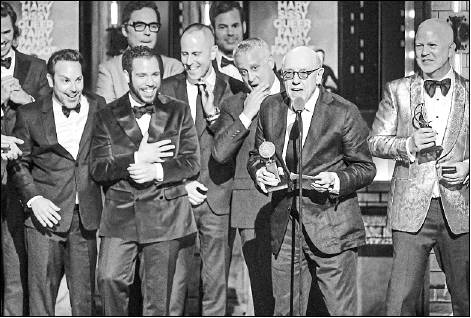Mart Crowley, 84, chronicled gay life in ‘Boys in the Band’
By Harrison Smith WASHINGTON POST
Mart Crowley, 84, a Tony Award-winning playwright whose comic tragedy The Boys in the Band helped bring openly gay characters onto the stage and screen, emerging as a landmark depiction of gay life more than a year before the Stonewall riots galvanized a national liberation movement, died Saturday at a hospital in Manhattan.
The cause was complications from heart surgery, said his goddaughter, Natasha Gregson Wagner. Her mother, actress Natalie Wood, was one of Mr. Crowley’s closest friends, hiring him as an assistant and housing him from time to time in the home Wood shared with her husband, Robert Wagner.
For much of his career, Mr. Crowley was overshadowed by gay playwrights such as Larry Kramer, whose drama The Normal Heart wrestled with the AIDS crisis of the early 1980s, and Tony Kushner, whose twopart epic Angels in America won the Pulitzer Prize. But Mr. Crowley’s 1968 examination of gay identity, repression, and selfloathing was a milestone for artists and other theatergoers who recognized themselves as one of The Boys in the Band, even if some of the play’s acid-tongued dialogue would come to seem dated.
“We all stand firmly on the shoulders of that play,” said writer and producer Ryan Murphy, who brought The Boys in the Band to Broadway in 2018 and is producing a movie adaptation for Netflix.
Murphy said that as a gay youth in Indiana, “I thought I was an alien” — a sentiment that vanished after seeing the 1970 movie adaptation, directed by William Friedkin and written and produced by Mr. Crowley.
Mr. Crowley wrote The Boys in the Band at a time when homosexuality was criminalized across most of the country and gay characters were rarely seen in pop culture, often appearing only for comic effect or in marginal roles that ended in tragedy.
Nonetheless, three of the country’s leading playwrights — Edward Albee, William Inge, and Tennessee Williams — were widely known to be gay, a fact that spurred a notorious New York Times essay by critic Stanley Kauffmann, who lamented “disguised homosexual influence” in the theater and called on dramatists to address gay themes headon, without using straight characters as stand-ins.
That 1966 essay amounted to a kind of dare for Mr. Crowley, a gay 30-year-old screenwriter with a self-described “sugarcane accent” from Mississippi. He was then broke, unemployed, and frequently drunk, albeit building a happier life for himself in Hollywood than he had as a young man in the South, where he was molested by a family friend as a child but found refuge watching movies and plays.
In a 2009 episode of the public television show Theater Talk, Mr. Crowley recalled writing The Boys in the Band while staying at the home of a wealthy friend, actress Diana Lynn, the daughterin-law of New York Post publisher Dorothy Schiff. Living for five weeks “in the lap of luxury — nannies, butlers, maids, and cooks” — he returned to his own home with the script of The Boys in the Band, which took its name from a throwaway line in the 1954 remake of A Star Is Born.
“There was a little of me in all the characters in that play,” Mr. Crowley once said.
Centered on a group of gay men gathered for a birthday party, The Boys in the Band premiered Off-Broadway at Theater Four on Easter Sunday, 1968. The original production never made it to Broadway but ran for more than two years and 1,001 performances.
Mr. Crowley went on to write several more plays but primarily supported himself with television work, including on the ABC detective series Hart to Hart. And while The Boys in the Band was produced in translation around the world, it remained far from Broadway until 2018, when a starstudded revival featured actors including Jim Parsons, Zachary Quinto, and Robin De Jesús. The production received a Tony Award for best revival of a play.
